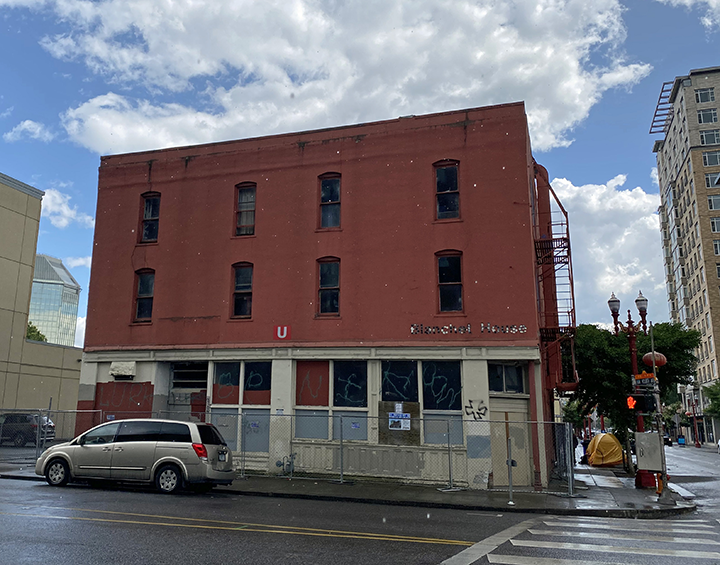
The Portland City Council voted unanimously to approve the demolition of the historic Yamaguchi Hotel, also known as the former Blanchet House, picture above.
On July 28th, the Portland City Council voted unanimously to approve the demolition of the historic Yamaguchi Hotel (former Blanchet House), a rare and very significant building to the Japanese American/AAPI community and a contributing building in the New Chinatown-Japantown Historic District. Restore Oregon opposed the demolition request because other options had not been fully explored and because it sets a very bad precedent in this small and fragile district.
We initiated a coalition of preservation and legal experts to join in support of the Japanese American Museum of Oregon and 14 other Japanese American organizations to propose an alternate win-win solution , but the Council’s vote demonstrated an unwillingness to invest any resources to pursue it.
Chisao Hata, Board member of the Japanese American Museum of Oregon, said “this feels like yet another slap in the face to our community that has endured successive waves of prejudice, loss, and erasure over many decades.”
The importance of this building lies not in its architecture, but in its rarity and deep connection to the Japanese American community.
Only three historic resources are associated with AAPI cultural heritage in all of Oregon: the Kam Wah Chung State Heritage Site, the Salem Pioneer Cemetery, and Portland’s New Chinatown-Japantown Historic District where the Yamaguchi Hotel is located. The hotel was operated by Shigezo and Masaye Yamaguchi and is one of only a handful of buildings still standing in the district that was operated by Japanese Americans at a time when people of Asian heritage were ostracized and afforded limited rights, and then lost virtually everything when interned during WWII.
Also, according to the National Register of Historic Places district nomination, Masaye Yamaguchi served as the midwife for the Asian community, and is said to have delivered babies as far away as Hood River. This untold and under-appreciated chapter of Oregon women's history has deep cultural significance.
The City Council did vote to create a "stakeholder" committee to recommend ways to document and incorporate the Japanese American history of the site into the future development. But no provisions were made to ensure those recommendations would be carried out.
With their ruling, the City also set aside its own policy that a historic building cannot be demolished without first approving the replacement structure. The intent of this policy is to provide a means to assess that the public benefit of the proposed new development is greater than the public benefit of preserving and reusing the historic structure. In this case, the owners claimed economic hardship and liability due to the deteriorated condition of the building - which occurred under their ownership - and asked the City to grant demolition with no proposal for what would replace it other than a vacant lot.
The owner, the Blanchet House, stated their hope is to create a low-income nursing facility. The community benefit might well outweigh the historic value of the building, and provide some comfort to the Japanese American community that the loss of their cultural heritage had achieved some other good. However, no plans for such a facility have been presented and no provision made in the conditions set for demolition to ensure that such a community benefit would be created on the site in exchange for this great loss.
Further, no consideration or mitigation was made for the loss of this contributing building on the historic district as a whole. Portland’s New Chinatown-Japantown Historic district is only 2 blocks wide and 5 blocks long. Nearly half of its historic buildings are already lost, so losing another one has a major impact that should be mitigated to some degree by investing in the rehabilitation of other historic buildings or other district improvements.
The City of Portland bears significant responsibility for this sad state of affairs. The current “new” Blanchet House was built on land occupied by the historic Kiernan Building (also known as the Dirty Duck Tavern) in a deal orchestrated by the Portland Development Commission (now Prosper Portland). The Kiernan Building was demolished to make way for the new Blanchet facility and the important social services it would provide. It did not have cultural ties to the AAPI community and demolition was not allowed until the new Blanchet House design was approved. The city agency arranged a “land swap” of the new site for the old, giving Blanchet House the new site with a provision that the PDC could exercise an option to take ownership of the old Blanchet House/Yamaguchi Hotel when the new Blanchet House was completed. The understanding was that the PDC would assume responsibility for stewarding the Yamaguchi Hotel building along with redevelopment of the rest of the block. But when the PDC/Prosper Portland walked away from this commitment, the Blanchet House was left to deal with the now-empty historic building.
Restore Oregon remains gravely concerned that Portland City Council has now set a precedent that other property owners in the historic district who have been engaged in demolition-by-neglect may try to seize upon: let your building deteriorate, then claim economic hardship and seek demolition approval. Recent zoning changes that allow increased heights in the district provide further incentive. We are concerned about the entire district and its vulnerability to be de-listed from the National Register of Historic Places.
The willingness of Portland’s City Council to permit the demolition the Yamaguchi Hotel exposes an alarming shift on City Council away from the Comprehensive Plan's goal of stewarding historic resources, a disconnect on “walking the talk” of respecting the cultural heritage of minority
communities, and a willingness to set aside its own policies on demolition of historic buildings. We will continue to support the Japanese American and AAPI community and are exploring potential next steps, including further appeal.

